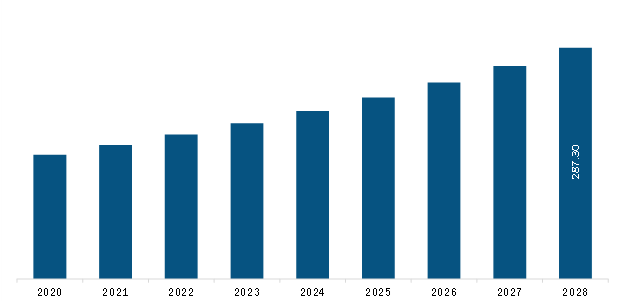The Europe infant, child, and maternal probiotic supplements market is expected to grow from US$ 179.18 million in 2022 to US$ 287.30 million by 2028; it is estimated to grow at a CAGR of 8.2% from 2022 to 2028.
Pregnant women are seeking various alternatives to support their fitness and the health of their unborn babies. Digestive problems, such as constipation, diarrhea, acidity, and inflammation, are common during pregnancy. Recently, the demand for probiotic dietary supplements among pregnant women has increased. A thoroughly researched probiotic strains help improve bowel movement and relieve constipation problems. Consumption of probiotic supplements in the regular diet help reduce inflammation, acidity, and bloating, and it also lowers the risk of vaginal infections, thus decreasing the chances of colic, eczema, and other allergies in newborn babies. Further, it also reduces the risk of pre-eclampsia in pregnant women, a health condition resulting in high blood pressure and high protein levels in urine. Probiotic supplements also ensure better immunity for pregnant women, which helps fight chronic diseases and ensure the baby's good health. Lactobacillus acidophilus, Bifidobacterium bifidum, and Saccharomyces boulardii are among the most effective and widely used probiotic strains in prenatal probiotic supplements. These strains help maintain a healthy intestinal flora and reduce the risk of various allergies, diseases, and complications, including gestational diabetes and pre-eclampsia. The growing awareness about the benefits of probiotic supplements among pregnant women and newborns is substantially driving the infant, child, and maternal probiotic supplements market growth.
With new features and technologies, vendors can attract new customers and expand their footprints in emerging markets. This factor is likely to drive the Europe infant, child, and maternal probiotic supplements market growth at a notable CAGR during the forecast period.
 Europe Infant, Child, and Maternal Probiotic Supplements Market Segmentation
Europe Infant, Child, and Maternal Probiotic Supplements Market Segmentation
The market for Europe infant, child, and maternal probiotic supplements market is segmented into form, end user, and country. Based on form, the market is categorized into capsules and soft gels, gummies, liquid, and others. Based on end user, the market is segmented into infant and toddler, children, and maternal women. Based on country, the Europe infant, child, and maternal probiotic supplements market is segmented into Germany, the UK, France, Italy, Russia, and the Rest of Europe.
Europe Infant, Child, and Maternal Probiotic Supplements Market — Companies Mentioned
Bayer Corporation, Nestlé S.A., BioGaia AB, and Nordic Naturals are a few major companies operating in the Europe infant, child, and maternal probiotic supplements market.

| Report Attribute | Details |
|---|---|
| Market size in 2022 | US$ 179.18 Million |
| Market Size by 2028 | US$ 287.30 Million |
| CAGR (2022 - 2028) | 8.2% |
| Historical Data | 2020-2021 |
| Forecast period | 2023-2028 |
| Segments Covered |
By Form
|
| Regions and Countries Covered |
Europe
|
| Market leaders and key company profiles |
|

The Europe Infant, Child, and Maternal Probiotic Supplements Market is valued at US$ 179.18 Million in 2022, it is projected to reach US$ 287.30 Million by 2028.
As per our report Europe Infant, Child, and Maternal Probiotic Supplements Market, the market size is valued at US$ 179.18 Million in 2022, projecting it to reach US$ 287.30 Million by 2028. This translates to a CAGR of approximately 8.2% during the forecast period.
The Europe Infant, Child, and Maternal Probiotic Supplements Market report typically cover these key segments-
The historic period, base year, and forecast period can vary slightly depending on the specific market research report. However, for the Europe Infant, Child, and Maternal Probiotic Supplements Market report:
The Europe Infant, Child, and Maternal Probiotic Supplements Market is populated by several key players, each contributing to its growth and innovation. Some of the major players include:
The Europe Infant, Child, and Maternal Probiotic Supplements Market report is valuable for diverse stakeholders, including:
Essentially, anyone involved in or considering involvement in the Europe Infant, Child, and Maternal Probiotic Supplements Market value chain can benefit from the information contained in a comprehensive market report.
Please tell us your area of interest
(Market Segments/ Regions and Countries/ Companies)